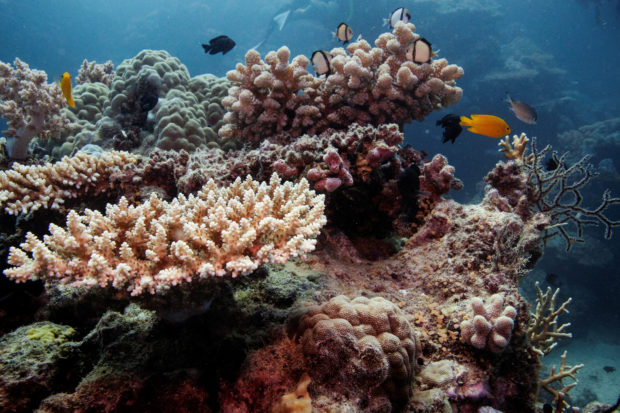
Reef fish swim above recovering coral colonies on the Great Barrier Reef off the coast of Cairns, Australia October 25, 2019. REUTERS FILE PHOTO
CANBERRA — The Great Barrier Reef should be added to a list of “in danger” World Heritage Sites a UN committee recommended on Tuesday, prompting an angry response from Australia which said it had been blindsided by the move and blamed political interference.
The United Nations Educational, Scientific and Cultural Organization committee, which sits under Unesco, said the world’s biggest coral reef system should be added to the list due to the impact of climate change.
Australia has for years been battling to keep the Great Barrier Reef, a major tourist attraction that supports thousands of jobs, off the “in danger” list. In 2015, Unesco noted the outlook for the reef was poor but kept the site’s status unchanged. Since then, scientists say it has suffered three major coral bleaching events due to severe marine heatwaves.
Australia’s Minister for the Environment Sussan Ley said Canberra had been assured there would be no recommendation on the reef by the UN before July.
Ley said she and Australia’s Minister for Foreign Affairs Marise Payne spoke overnight with the Director General of Unesco, Audrey Azoulay.
“This decision was flawed. Clearly there were politics behind it,” she said.
Ley did not elaborate, but a government source said Canberra believes China as responsible amid a souring of relations between the two countries. Chinese officials enjoy strong sway on three committees, while a Chinese lawmaker is chairman of the World Heritage Committee, the source said.
“We will appeal but China is in control, the meeting is in China, we don’t have much hope,” the source said, declining to be named as he is not authorized to talk to the media.
Environmental groups, however, rejected Australia’s assertion that the recommendation was political.
“The recommendation from Unesco is clear and unequivocal that the Australian Government is not doing enough to protect our greatest natural asset, especially on climate change,” said Richard Leck, Head of Oceans for the World Wide Fund for Nature-Australia, in an emailed statement.
The UN recommendation, which will be considered at a meeting of the committee in China next month, undercuts Australia’s assertion that it is taking climate change seriously.
Australia reliance on coal-fired power makes it one of the world’s largest carbon emitters per capita, but its conservative government has steadfastly backed the country’s fossil fuel industries, arguing tougher action on emissions would cost jobs.
Relations between Canberra and Beijing soured last year after Australia accused China of meddling in domestic affairs, and worsened when Prime Minister Scott Morrison sought an independent inquiry over the origins of the coronavirus pandemic.
China has since moved to limit imports of Australian barley, beef, cotton and seafood.